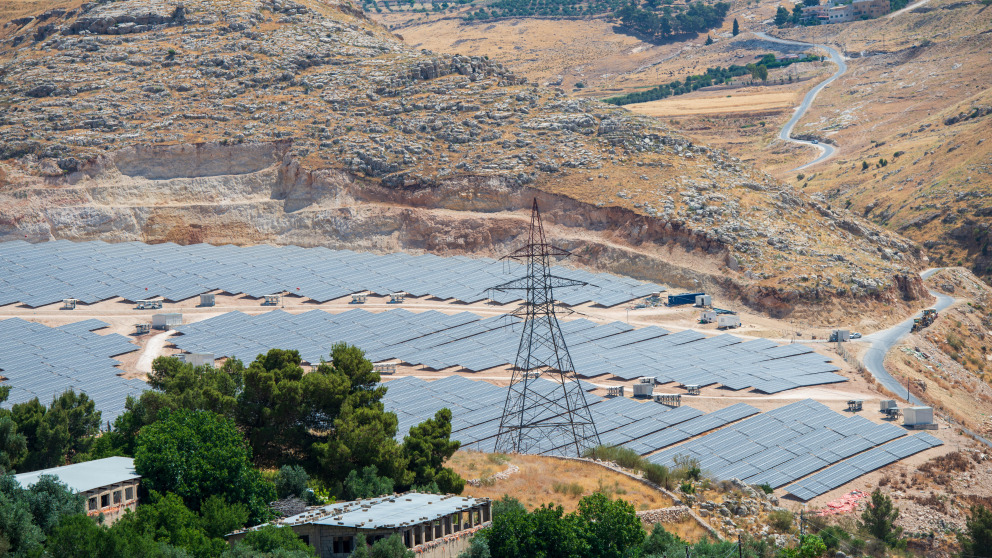Accelerating the Jordanian Energy Transition
06.12.2022
Jordan’s energy transition has been rapid and ambitious: in 2021 renewables accounted for 26% of electricity production in Jordan, up from less than 1% in 2014. This massive leap forward was prompted by energy security concerns in the wake of the Arab Spring. Since then, Jordan has emerged as a regional clean energy frontrunner, with over 300 PV companies and around 13,000 employees in the sector. But progress has stalled in recent years, largely due to conflicts between Jordan’s renewable energy goals and the costs of fossil fuel over-capacity for the state-owned electricity transmission and distribution company NEPCO. A new IASS Policy Brief considers how regional cooperation, stakeholder participation, and electricity market reforms could put Jordan's energy transition back on track.

The loss of momentum affecting the Jordanian energy transition is largely due to the financial burdens imposed by NEPCO, which is caught in take-or-pay purchasing agreements for fossil fuels as well as long-term contracts to buy electricity produced with these fuels. NEPCO’s purchasing and supply commitments, combined with the rapid growth in renewables, has led to a situation of oversupply in which the company’s debts are worsened when renewables ‘force’ fossil capacity off the grid. With 20% of public debt linked to the electricity sector, NEPCO’s plight has far-reaching implications. Increased regional cooperation will be needed to re-negotiate Jordan’s commitments to purchase fossil fuels and fossil electricity, and to expand the regional market for electricity, allowing Jordan to export surpluses and establish itself as clean energy hub. And while Jordan’s previous top-down approach to energy policy was crucial to driving the rapid growth of renewables, it is evident that stakeholders from different ministries as well as industry and civil society must be involved in future policy development processes to accelerate Jordan’s energy transition and shift from a single-buyer model to a more competitive market for electricity.
In the IASS Policy Brief “Accelerating the Jordanian Energy Transition”, the authors draw on the findings of stakeholder workshops with participants from various sectors to make three key recommendations:
1) Increase regional cooperation: Efforts to expand cross-border energy interconnections should be scaled up and accelerated, targeting neighbouring countries as well as the Gulf and Europe. Other forms of regional cooperation that could reduce NEPCO’s debt burden should be investigated, such as re-negotiating power purchase agreements or joint green hydrogen and ammonia projects.
2) Involve stakeholders in energy policy development and decision-making: Relevant stakeholders from industry and finance should take part in national energy planning efforts. International donors should ensure their engagement in Jordanian energy issues involves local industry, research, and finance experts so that the broader impacts and implications of energy decisions are understood.
3) Reform the electricity market: The single-buyer model has not served Jordan well and efforts to liberalise the electricity market should be pursued at pace. As part of these reforms, NEPCO should be restructured and repositioned as a transmission system operator. An action plan for market liberalisation should be developed in cooperation with relevant ministries and stakeholders, ensuring the involvement of actors beyond NEPCO.
The policy brief was prepared by scientists from the IASS research group “Energy Transition and the Global South”, which investigates challenges faced by countries of the Global South in connection with global decarbonisation processes. Their research aims to develop recommendations for equitable forms of governance for energy transition processes in order to reconcile conflicting policy goals. In this process, local contexts and systemic risks due to a country’s positioning in the global economic system or lack of access to technologies and capital are further investigated. To identify policy options, the team worked closely with local stakeholders on select case studies and developed its recommendations through workshops with local experts and decision-makers. This policy brief is the second in a series presenting recommendations to advance energy transitions in Malaysia, Jordan and Kenya.
Weko, S., Hermann, J., Apergi, M., Eicke, L., Goldthau, A., Kurniawan, J., Schuch, E. (2022): Accelerating the Jordanian Energy Transition. - IASS Policy Brief, 2022, 6.
https://doi.org/10.48481/iass.2022.043
